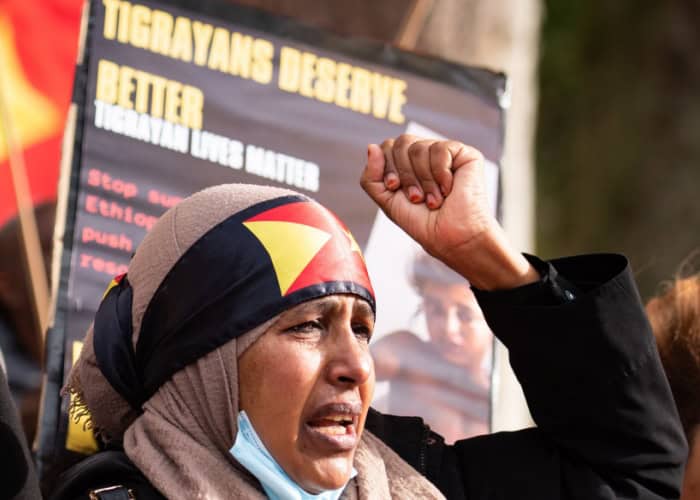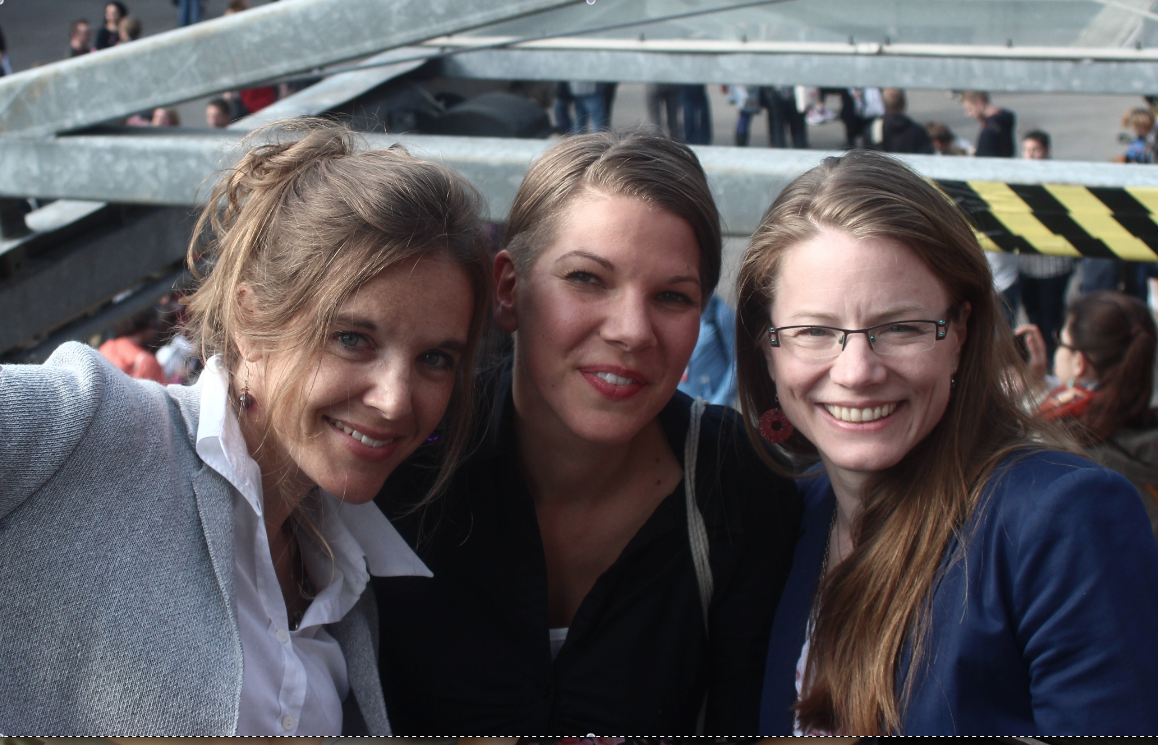Conflicts in Yemen and Ethiopia, described as ‘the world’s worst humanitarian crisis’ and ‘the deadliest war of the 21st century’, were barely covered by mainstream media in some European countries, study shows.

London, England, UK: Protesters hold signs and flags at the Tigray Genocide Protest outside 10 Downing Street. Credit: Loredana Sangiuliano
The German Tagesschau on public broadcaster ARD, its Swiss counterpart of the same name on SRF and the Zeit im Bild (ZIB) 1 on Austria’s public broadcaster ORF are, undisputedly, the news programmes with the broadest reach in their three countries of origin. The 15-minute German Tagesschau’s main edition at 8 pm generally has an audience market share of around 40%, while the Swiss 25-minute version at 7:30 pm and the 20-minute ZIB 1 programme at 7.30 pm each attract around 60% of the audience base in their countries.
The three daily news programmes are among the most important news sources for many viewers. Accordingly, the question of which geographical areas these programmes cover and which are hardly or not at all included is important, especially as recent studies show that the global south plays almost no role in the news. In fact, in the first half of 2022, these outlets gave more airtime to sports news than to all the countries in the global south combined.

Number of reports in which the respective countries were mentioned in the German “Tagesschau” in 2022.

Number of reports in which the respective countries were mentioned in the Austrian “Zeit im Bild (ZIB) 1” in 2022.

Number of reports in which the respective countries were mentioned in the Swiss “Tagesschau” in 2022.
Ignored humanitarian crises
While the Covid pandemic dominated the news in 2020 and 2021, the war in Ukraine and its effects – particularly in the energy sector – dominated the news in 2022. There is no doubt that the war in Ukraine had and continues to have far-reaching human, political and socio-economic consequences globally. However, 2022 also saw a series of humanitarian crises and disasters in the global south that attracted very little media attention.

Examples of crises and disasters ignored or heavily neglected in the news in 2022.
In the leading news programmes in Germany, Austria and Switzerland, these events generally received little and sometimes no attention. The geographical distribution of reports shows that the global north dominated the news and the lead stories. In fact, in 2022, only 10.8% and 10.5% of the airtime in the German and Swiss Tagesschau news programmes was devoted to the global south, while for ZIB 1, it was 8.9% – with only around 5% of this airtime included in lead stories in each case.

Share of the Global South, where around 85 per cent of the world’s population lives, in the news in the most important news programmes in Switzerland, Austria and Germany (figures in per cent).
The civil war in Tigray, Ethiopia, is a particularly glaring example of the neglect of the global south. According to estimates, up to 600,000 people died in the conflict between the Ethiopian central government and separatists. This makes it the deadliest war of the 21st century. However, it has been almost completely ignored by leading media and mainstream news in some European countries.
For example, while the SRF’s Tagesschau programme spent around 113,315 seconds on the war in Ukraine in 2022, it only devoted one 150-second report to the war in Ethiopia in the entire year. The situation was marginally better in Germany, with Tagesschau spending 255 seconds on the Tigray conflict, while ZIB 1 dedicated a mere 40 seconds to its coverage.
The neglect in the news also applies to the situation in Yemen, which the United Nations has categorised as “the world’s worst humanitarian crisis”. By the end of 2021, it was estimated that over 377,000 people had died in the civil war between Houthi rebels and the government. In 2017, the country faced the world’s largest cholera epidemic ever recorded, and at the end of 2022, UNICEF called for urgent action, highlighting the fact that more than 11,000 children had been killed or injured. Around two-thirds of the population – more than 23 million people, half of them children – are still dependent on humanitarian aid.
Although Yemen was briefly mentioned in three reports by Swiss Tagesschau, none of them addressed the humanitarian emergency. In Austria, ZIB 1 only dedicated around 185 seconds to Yemen in 2022, while the German version of Tagesschau gave it around 360 seconds.
Geographical reporting patterns
So, there are striking similarities in the geographical reporting patterns of the three news programmes. Overall, the German and Swiss Tagesschau and the Austrian ZIB 1 belong to the group of media in German-speaking countries that only give around 10% of their broadcasting time to news from the global south, even though the grouping is home to more than 85% of the world’s population.
This pattern of reporting is significantly less receptive to events that occur in developing and least developed countries. While the interest in topics from countries that are geographically, economically or culturally closer is understandable to a certain extent, the dominance of reports from the global north is staggeringly overwhelming. The leading news programmes in Europe have to ask themselves why they are almost completely ignoring major and important events, such as the conflicts in Ethiopia and Yemen, which have a global impact.
Misplaced priorities
This questionable prioritisation of news from the global north became blatantly obvious when the Swiss Tagesschau spent 180 seconds reporting on Will Smith slapping Chris Rock at the Oscars, following this with a 145-second report on the Oscar results. This gave the incident between the two US actors more airtime than the war in Tigray and the world’s worst humanitarian crisis in Yemen combined. In its annual review, the Swiss Tagesschau took another 65 seconds to recall the slap while failing to address the civil wars in Tigray and Yemen.
Mainstream news programmes have a great responsibility. They play an important role in determining what viewers engage with politically. The news not only describes what is being discussed and thought about but also helps to determine this and, therefore, has a powerful influence on which topics are dealt with politically and possibly resolved. Therefore, it is critical that the value of news events is primarily judged according to their human dimensions and impact and not their geographical location or cultural and economic status.
Further research results can be found here on the German-language EJO pages or here in an English-language “Google Translate” translation.
The original study (in German) “Vergessene Welten und blinde Flecken” (Forgotten worlds and blind spots), which analysed over 5,500 issues of the German “Tagesschau” news programme, as well as various supplementary analyses of German-language media, can be viewed and downloaded free of charge at www.ivr-heidelberg.de
The site also includes a petition, video summaries and information on a travelling exhibition based on the research.
Opinions expressed on this website are those of the authors alone and do not necessarily reflect or represent the views, policies or positions of the EJO or the organisations with which they are affiliated.
If you liked this story, you may also be interested in: How a summer school is sowing seeds for strong, independent journalism in Ruissia
Tags: Austrian media, German Media, Swiss Media, Tagesschau, War in Tigray, Yemen conflict, Zeit im Bild












































